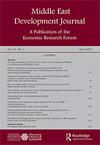Macroeconomic effects of global shocks in the GCC: evidence from Saudi Arabia
IF 0.9
Q4 DEVELOPMENT STUDIES
引用次数: 6
Abstract
ABSTRACT We develop a quarterly macro-econometric model for the Saudi economy over the period 1981Q2-2018Q2 and integrate it within a compact model of the world economy (including the global oil market). This framework enables us to disentangle the size and speed of the transmission of growth shocks originating from the United States, China, and the world economy to Saudi Arabia, as well as study the implications of stress in global financial markets, low oil prices, and domestic fiscal adjustment on the Saudi economy. Results show that Saudi Arabia's economy is becoming more sensitive to developments in China than to shocks in the United States – in line with the direction of evolving trade patterns and China's growing role in the global oil market. A global growth slowdown (e.g. from trade tensions or geopolitical developments) could have significant implications for Saudi Arabia (with a growth elasticity of about 2½ after one year) and the oil market (reducing prices by about 5% for 0.5 percentage point reduction in global growth). We also illustrate that a 10% lower oil prices and stress in global financial markets could both have a negative effect on the Saudi economy, but given the prevailing social contract in Saudi Arabia, their impact is countered by fiscal easing. Finally, we observe that a domestic fiscal adjustment in Saudi Arabia does not show a negative impact on economic growth in the data. The impact on growth would depend upon the quality of fiscal adjustment and whether it is complemented with structural reforms.全球冲击对海湾合作委员会的宏观经济影响:来自沙特阿拉伯的证据
摘要:我们为沙特经济制定了1981Q2-2018Q2的季度宏观经济计量模型,并将其整合到世界经济(包括全球石油市场)的紧凑模型中。该框架使我们能够理清源自美国、中国和世界经济的增长冲击向沙特阿拉伯传递的规模和速度,并研究全球金融市场压力、低油价和国内财政调整对沙特经济的影响。结果显示,沙特阿拉伯经济对中国的发展比对美国的冲击更加敏感,这与不断演变的贸易模式和中国在全球石油市场中日益增长的作用相一致。全球增长放缓(如贸易紧张局势或地缘政治发展)可能对沙特阿拉伯(一年后增长弹性约为2.5)和石油市场(全球增长下降0.5个百分点,价格下降约5%)产生重大影响。我们还表明,油价下跌10%和全球金融市场的压力都可能对沙特经济产生负面影响,但鉴于沙特阿拉伯普遍存在的社会契约,财政宽松可以抵消其影响。最后,我们观察到,数据中沙特阿拉伯的国内财政调整并没有对经济增长产生负面影响。对增长的影响将取决于财政调整的质量以及是否辅以结构性改革。
本文章由计算机程序翻译,如有差异,请以英文原文为准。
求助全文
约1分钟内获得全文
求助全文

 求助内容:
求助内容: 应助结果提醒方式:
应助结果提醒方式:


